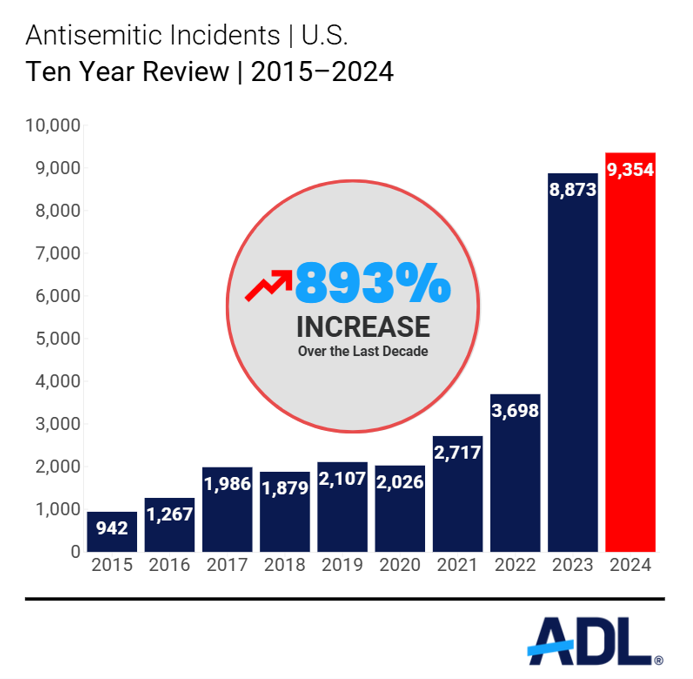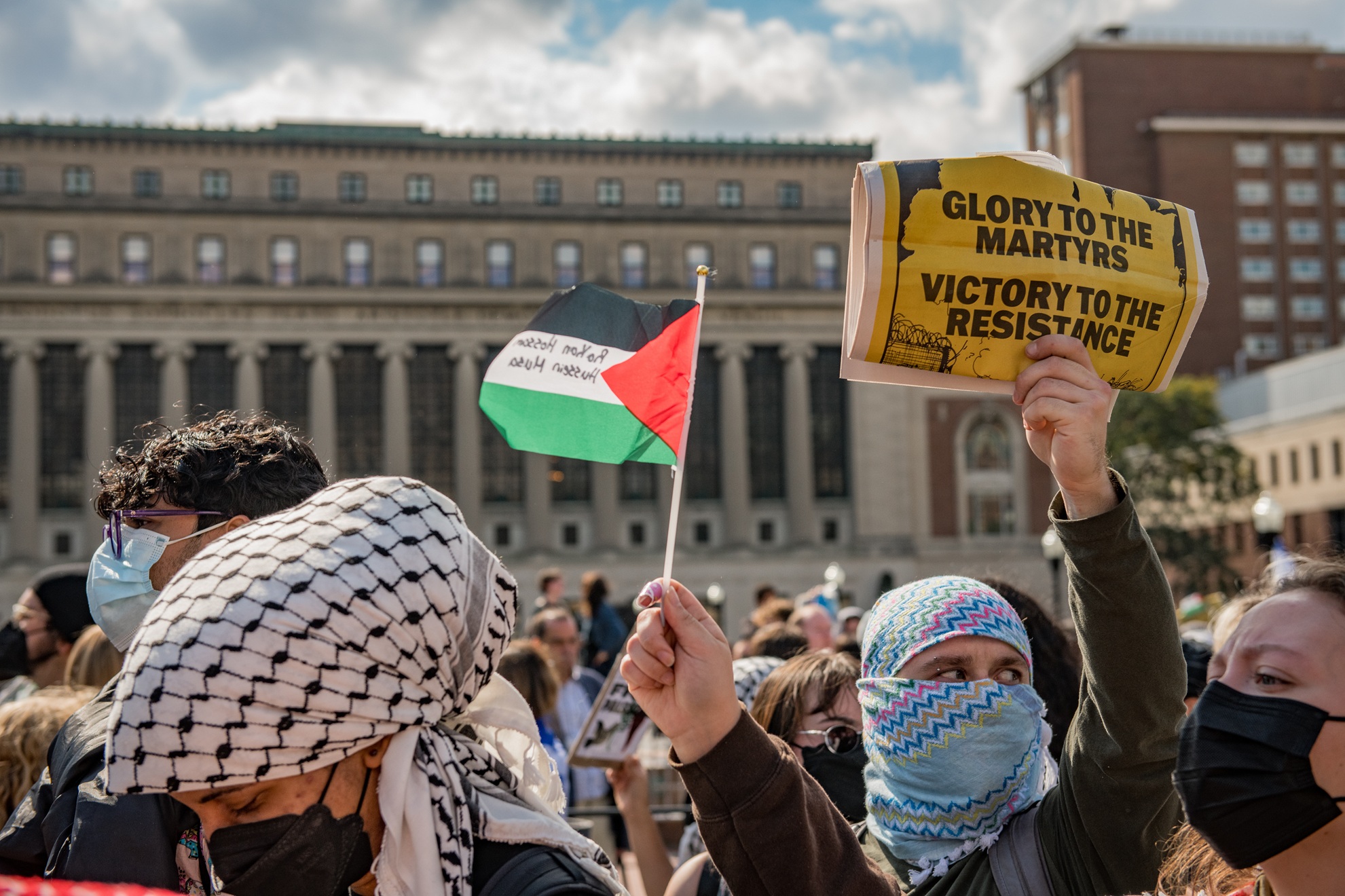Publications
INSS Insight No. 2012, July 13, 2025
The Trump administration has made combatting antisemitism a centerpiece of its domestic policy, focusing especially on the climate for Jewish and Israeli students at institutions of higher education. The administration’s policies to pressure university’s to adopt reforms have included severe cuts to research funding, limits on enrollment of international students, and attempts to deport pro-Palestinian activists. Perhaps surprisingly given the scope of the problem of antisemitism, Jewish communal responses to the Trump administration strategies have been ambivalent. We explore the reasons for the Jewish community’s reticence about the Trump administration’s approach, and encourage Israeli public officials to refrain from alignment with one side or another in the increasingly politicized debate over higher education in the United States.
The Trump administration has been leading a rapid effort to transform the United States and its institutions, and within this effort, a crackdown on antisemitism has taken a central role. The administration’s policies in the name of combatting antisemitism have focused to a large degree on institutions of higher education. Actions taken have included attempts to deport pro-Palestinian activists and to impose reforms on universities deemed hostile to Jewish and Israeli students. These measures include enormous cuts to research funding, particularly at Harvard, Columbia and other elite institutions; a ban on visas for international students at Harvard; and threats to tax university endowments. More broadly, the administration has announced plans to screen the social media pages of all student visa applicants and a travel ban on visitors from 12 countries deemed to pose security risks.
The Trump administration’s crackdown comes amid a surge in antisemitism unleashed by the October 7 war, which has grown increasingly violent in recent months. In early June, 15 people were injured by an assailant wielding an improvised flame thrower at a weekly hostage rally in Boulder, Colorado. In May, in Washington DC, Israel Embassy staffers Sarah Milgrim and Yaron Lischinsky were killed outside an event for young diplomats by a gunman shouting, “Free Palestine.” In April, on the evening of Passover, Pennsylvania Governor Josh Shapiro’s house was burned in an arson attack that began while the family slept.
According to the Anti-Defamation League, which tabulates antisemitic incidents, in 2024 there were 6,552 incidents of harassment, 2,606 incidents of vandalism and 196 incidents of assault—an overall increase of 344% compared to five years earlier, and 893% compared to ten years earlier (see Figure 1). For the first time in 2024, most antisemitic incidents (58%) were related to Israel or Zionism. Anecdotally as well, American Jews and Israelis in the United States have been reporting an increased sense of insecurity.
Figure 1. Antisemitic Incidents in the United States

Perhaps surprisingly given the scope of the problem, American Jewry’s leading organizations in the fight against antisemitism have expressed ambivalence concerning the administration’s policies. Jonathan Greenblatt, head of the Anti-Defamation League, has described the government’s actions to pressure universities as “bold and important.” At the same time, he criticized the administration for seeming to flaunt due-process in the deportations of several pro-Palestinian activists who are not US citizens.
Ted Deutch, the head of the American Jewish Committee, also a leading civil rights organization, has similarly tried to steer a middle course between support and opposition. During the AJC’s Global Forum in April, he explained the organization’s approach:
"We support the President using every legal tool to ensure that universities that did not protect Jewish students in the aftermath of October 7 take the necessary actions to protect Jewish students now . . . At the same time, when the government unilaterally cuts funding to universities in a way that puts at risk lifesaving research, or pursues unrelated political goals in the name of fighting antisemitism, it risks backlash against the American Jewish community, and we have and we will speak out" (Global Forum, New York, April 2025).
Meanwhile, organizations on the more liberal side of the spectrum have expressed sharper criticism. In a joint statement issued in May, the Jewish Council for Public Affairs, Reform and Conservative movements, and other liberal groups charged that the Trump administration’s cuts to university research funding and alleged violations of civil rights make Jews less safe:
"We reject any policies and actions that foment or take advantage of antisemitism to undermine democratic norms and rights, including the rule of law, the right of due process, and/or the freedoms of speech, press, and peaceful protest. It is both possible and necessary to fight antisemitism—on campus, in our communities, and across the country—without abandoning the democratic values that have allowed Jews, and so many other vulnerable minorities, to thrive".
The view that the administration’s actions threaten democratic values, liberal institutions, and rule of law has been echoed in a number of public statements, including one in April from a prominent roster of Jewish leaders and former heads of major Jewish organizations. As noted, however, current heads of organizations—such as the ADL’s Greenblatt—have been more muted in their criticism.
The Jewish public also appears divided on the Trump administration’s strategy for combating antisemitism. In a national survey of American Jews conducted in May—prior to the murders in Washington DC and the attack in Colorado—62% were “very concerned” about antisemitism. While this remains high by historic comparisons, it reflects a decline from the 79% who expressed the same level of concern in November 2023, soon after the October 7 Hamas attack. In the same survey, however, most Jewish respondents thought the Trump administration’s policies were more likely to increase antisemitism than to reduce it. For example, 61% of respondents thought “arresting and deporting pro-Palestinian activists who are legal residents” was likely to increase antisemitism, compared to 20% who thought it was more likely to reduce it. Similarly, 49% believed “withholding funding from colleges” would increase antisemitism whereas 25% thought it would decrease it. Another national survey of American Jews conducted at about the same time found that 56% opposed the administration’s policies to combat antisemitism, compared to 31% who expressed support.
Assessment and Recommendation
After half a century during which most American Jews thought that a history of persecution was mostly a thing of the past, rising anti-Israelism and antisemitism have become a worsening crisis for American Jews. The antisemitic murders of young adults in the nation’s capital and the attack on hostage solidarity marchers in Boulder will continue to reverberate widely. Jewish institutions are already hardened against the world with armed guards and metal detectors. Many of the same universities that have been pushing back against the administration’s interventions, acknowledge the fears, discrimination, and social costs Israeli and Jewish students have experienced over the last few years.
Most American Jews, however, will likely continue to express either ambivalence or opposition to the Trump administration’s approach to combatting antisemitism. To an extent, their attitudes reflect partisan instincts, as most American Jews identify as Democrats and voted for Kamala Harris in the 2024 presidential election. There are, however, three additional reasons for American Jews’ reticence. First, they believe that the Trump administration seeks to weaken the liberal legal, institutional, and cultural order that American Jews helped to establish, and that enabled their flourishing within American society. That order includes a legal regime of civil rights and minority protections, separation of church and state, and a meritocratic economy that prizes knowledge and professional expertise. Several of the university presidents who have been most vocal against the administration’s actions, are themselves Jewish. Many American Jews view Trump’s campaign against antisemitism as a pretext for a populist assault on liberal institutions and cultural values. They therefore view the administration’s antisemitism policy as threatening to their standing as a very small minority within a mostly white, Christian society.
Second, American Jews are concerned about antisemitism on the right as well as the left, and some view the president and, especially, many of his supporters, as vehicles of that kind of antisemitism. Despite having a Jewish daughter and Jewish grandchildren, Trump has frequently seemed to signal approval for antisemitism, for example, by referring to neo-Nazi marchers in Charlottsville as “very fine people,” and hosting a prominent Holocaust revisionist at Mar-a-Lago during the election campaign. He has characterized Jews who continue to support Democrats as disloyal to Israel, and described Senator Chuck Schumer, the minority leader of the US Senate and highest ranking Jewish elected official—who had just completed a book on antisemitism—as “not Jewish anymore . . . a Palestinian.”
Third, as Ted Deutsch suggested, many American Jews fear backlash. This could take the form of increased antisemitism—for example, blaming Jews for the destruction of universities, the crackdown on free speech, and assaults on liberal constituencies. It could also take the form of the politicization of antisemitism, coding it as a “Republican” issue, such that a future Democratic presidential administration could simply cancel the Trump administration’s policies. This would be especially easy to do, as most of Trump’s interventions have been executed by executive order rather than written into law—making them as vulnerable to reversal by future presidents, as some of Biden’s policies were to Trump.
Israel over the years has voiced concerns about campus anti-Zionism and antisemitism, and it has engaged with groups who target pro-Palestinian and anti-Israel activism. As the Israeli government continues to develop its approach to combating antisemitism abroad, it should take note of American Jews’ views on how accusations of antisemitism function in contemporary American political debates. Concerned over backlash, liberal values, and political partisanship, many Jews find themselves opposed to many of the actions that are ostensibly aimed at fighting antisemitism. Israeli officials in the Foreign Ministry, Diaspora Affairs Ministry, and the Prime Minister’s Office should consider the positions of establishment Jewish organizations, the major religious denominations, and rank-and-file Jews when crafting their responses to the Trump administration’s policies on antisemitism. And as the fight over campus antisemitism becomes intensely politicized and caught up in the broader battle over the trajectory of the American Republic, it is best, in our view, that Israel refrain as much as possible from appearing to support or encourage campus crackdowns done, at least in part, in its name.
This publication was made possible by the partnership of the Ruderman Family Foundation



